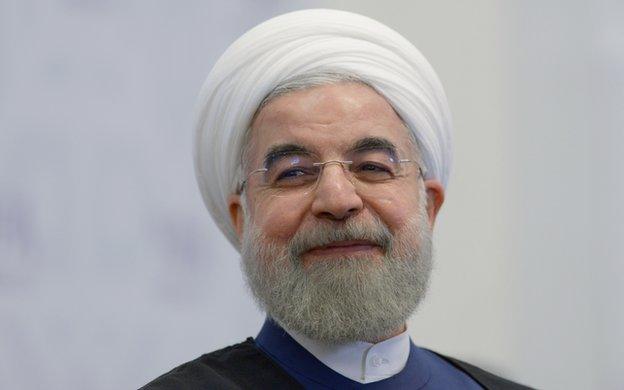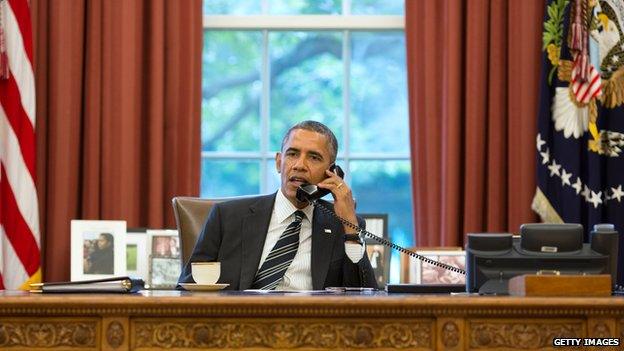Iran nuclear deal: A 10-point primer
- Published
- comments

Iran's president Hassan Rouhani
World powers have reached a deal with Iran on limiting Iranian nuclear activity in return for the lifting of international economic sanctions. What are the main takeaways? Here's a quick rundown.
1. It curbs Iran's nuclear programme, it doesn't stop it. They will still have nuclear plants, and the ability to re-process and enrich their own uranium fuel - the US gave up on the goal of stopping that two years ago.
2. Iran's leaders have always said they don't want to make the bomb, and even Israeli briefings have conceded that Tehran has never made a decision to press on with nuclear weapons production. Today's agreement attempts to ensure things remain that way, with an expanded verification regime.
3. The most important immediate implication for the region is that Iran is going to get a lot more cash - from unfrozen assets and expanded oil sales - and Saudi Arabia will be the biggest net loser in this.
4. Iran's desire to escape the sanctions regime has defined many of its concessions, from accepting that some facilities it once hoped to exclude from the deal (such as the Arak plutonium reactor) would have to be rolled in, to accepting that an embargo on conventional weapons sales will remain for a good deal longer.
5. For those hoping Iran might use some of that money to buy lots of arms (principally Russia and China), today's agreement is a disappointment. It extends the current arms embargo for five years and one on new ballistic missile technology for eight years. This is one of the big (positive) surprises of the past week's talks, since last week Russia tried to get an immediate lifting. Iran's desire to end sanctions proved stronger though, so they didn't hold out on this.
6. Since businesses owned by the Iranian Revolutionary Guards are among the principal sanctioned entities, many Gulf states will be concerned about the Guards using the extra cash to back its Shia brethren in Lebanon, Syria, Yemen, Bahrain, and eastern Saudi Arabia. Today France's president said the world would be watching closely to see that the Guard does not use its additional funds to sponsor unrest in the region.

President Obama talking on the phone to President Rouhani of Iran in September 2013
7. Optimists hope that far from destabilizing the region with its extra resources, the agreement opens the way for increased cooperation. From Lebanon through Syria and Iraq to Afghanistan, it's possible to see how Iran could help bring stability if of course it wants to. Last week one of Iran's deputy foreign ministers hinted that his country didn't see Bashar al-Assad as president for life in Syria. Does this suggest an Iranian willingness to help in an international plan to end the Syrian civil war? That's one key thing we will be looking for.
8. Whatever your views about Israel and the power of its vaunted Washington lobby, this is a good moment to note that years of outspoken opposition to this deal have failed to change the course of US policy on the Iranian nuclear issue - and it's a pretty vital one. There is much that still unites Israel and the US, but today an alliance that has helped define Middle East affairs for decades seems that bit weaker.
9. The same goes for the Saudi Arabian lobby, which is also sometimes talked up by Washington insiders in near mystical terms. Its opposition was a good deal less public than Israel's, but now Saudi Arabia has to recalculate the terms of its alliance with the US.
10. If the Middle East is to be increasingly defined by the Sunni-Shia schism, this deal will allow the US and its Western allies to claim a little more credibly to be neutral in that intra-Islamic quarrel. Up until now, their desire to arm the Gulf states and support them strategically undermined such notions. But the US, UK, France and Germany will all - once the agreement is ratified - be free to trade with Iran on a grand scale and to expand all manner of other ties.
There's more analysis from Mark Urban and the Newsnight team at Newsnight Live